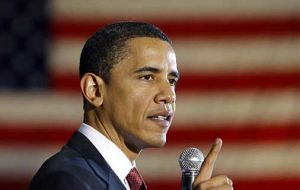MercoPress. South Atlantic News Agency
Taxpayers will no longer be hostages of banks “too big to fall” promises Obama
 President Obama’s proposed framework could mean splitting the big banks
President Obama’s proposed framework could mean splitting the big banks US President Barack Obama has proposed significant new curbs on the activities of banks to try to prevent future financial crises. The plans - the most far-reaching yet -include limits to the size of banks and restrictions on riskier trading.
“Never again will the American taxpayer be held hostage by banks that are too big to fail,” Mr Obama said. He added he was ready for a “fight” with any banks prepared to lobby against tougher regulations.
“While the financial system is far stronger today than it was one year ago, it is still operating under the exact same rules that led to its near collapse,” Mr Obama said.
His proposals also include a ban on retail banks from using their own money in investments - known as proprietary trading. Instead, banks would be limited to investing their customers' funds.
The industry lobby group for banks suggested Mr Obama was trying to return the US to the past.
“The better answer is to modernise the regulatory framework and not take the industry and the economy back to the 1930s” said the Financial Services Roundtable, an industry group that represents large Wall Street institutions.
In the UK, shadow chancellor George Osborne said that if the Conservatives won the next general election, they would impose an identical dismantling of UK banks to those suggested by the US president.
City Minister Lord Myners said the US proposals were “very much in accordance with the direction we have been setting”.
Mr Obama's move is his first proposal since Republican Scott Brown's shock victory in Massachusetts to win a Senate seat.
The Republican victory may make it harder to get Mr Obama's proposals passed in the Senate, as they are more likely to get held up in political wrangling.
“This is a political effort because of what happened in Massachusetts,” said economist Peter Morici of the University of Maryland.
Banks have also been lobbying against more stringent regulation.
“If these folks want a fight, it's a fight I'm ready to have,” Mr Obama vowed.
The president dubbed his proposals on limiting bank risk the Volcker rule - after Paul Volcker, one of his economic advisors and a former chairman of the Federal Reserve central bank.
The moves follow popular anger at financial institutions that have been paying large bonuses to staff even as they accepted government bail-outs to keep them going.
President Obama's proposals appear to be a return to the principles underlying the Glass-Steagall Act.
That law -from the 1930s in the aftermath of the Great Depression- separated commercial and investment banking and was eventually abolished in 1999 under President Bill Clinton.
Mr Clinton's financial secretary at the time, Robert Rubin, previously worked at Goldman Sachs and went on to be an advisor to Citigroup until last year.
The latest proposals follow a 117 billion levy on banks to recoup money US taxpayers spent bailing out the banks. The tax will claw back some of the losses from a 700 billion taxpayer bail-out of US banks known as the Troubled Asset Relief Program (Tarp).
It was drawn up in the midst of the financial crisis in 2008, following the collapse of US investment bank Lehman Brothers and rescue of insurance giant American International Group (AIG).-




Top Comments
Disclaimer & comment rules-

-

Read all commentsyou know that China and Japan hold US' s hanging rope ..!!??
Apr 18th, 2010 - 09:00 am 0LOL. This article reminds me the stupid of Nicholas!!!
Apr 18th, 2010 - 09:35 am 0Commenting for this story is now closed.
If you have a Facebook account, become a fan and comment on our Facebook Page!